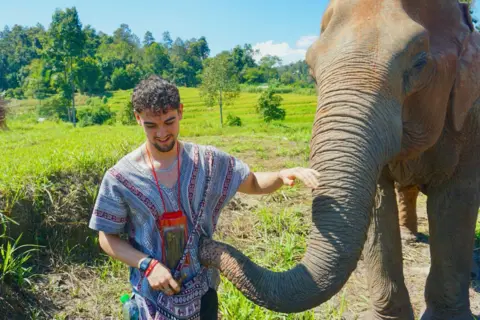In a sobering story of tragedy and survival, Calum Macdonald, a young traveler from the UK, recounted his harrowing experience with methanol poisoning that resulted in his blindness during a trip to Laos. Arriving at the Vietnamese border after a night of partying with friends in Vang Vieng, he was struck by a “kaleidoscopic blinding light” that rendered him unable to read the administrative forms in front of him. This onset of visual impairment occurred just after indulging in free whisky and vodka shots mixed with soft drinks at a local hostel, leading him to suspect something sinister was at play.
Initially attributing his symptoms to potential food poisoning, Calum did not realize the gravity of the situation until it became apparent that he was unable to see. A light that should have illuminated his surroundings instead plunged him into darkness; when he and his friends were in their hotel room in Vietnam, he inquired why the lights were off, only to be met with disbelief as they were indeed on. At the age of 23, Calum has now come to terms with his new reality of living without sight, recounting his experience for the first time on a platform such as BBC Breakfast.
Calum’s ordeal was part of a more extensive issue in Vang Vieng, where six individuals tragically died due to the same poison. Among the deceased were two Danish women he had connected with during his time at the Nana Backpacker Hostel, which had served as the drinking establishment where the contaminated alcohol was dispensed.
In the aftermath, his situation inspired collaboration with families of other British travelers who lost their lives due to methanol poisoning in Southeast Asia, including Simone White, a 28-year-old who sent a message to her mother claiming it was the best holiday ever right before experiencing the cruel twist of fate that led to her being placed in a coma. Sadly, she did not survive her ordeal after doctors advised her mother to consent to emergency surgery. The heart-wrenching sentiment echoed from Simone’s mother highlights the unpredictability of such poisons and the profound loss of life that occurs due to neglectful beverage production.
Methanol, often found in cleaning products, fuels, and antifreeze, is similar to the ethanol in alcoholic beverages but is exponentially more toxic. Contamination can arise when adulterated spirits are produced poorly, leading to a troubling epidemic, especially in regions like Southeast Asia. According to reports, hundreds suffer from methanol poisoning each year, with initial symptoms often confusingly resembling a typical hangover. Serious complications can manifest ranging from seizures to permanent disabilities as severe as total blindness or coma after the ingestion of just 30ml of methanol.
Calum’s experience has become a rallying point for advocacy, leading to calls for more explicit warnings from the Foreign Office regarding the dangers of such poisoning incidents endemic to certain vacation spots. Travelers are particularly urged to be wary of free drinks and poorly regulated spirits during their adventures, particularly in locations like Vang Vieng that cater to party-seeking tourists.
In a bittersweet twist to this story, Calum has found strength through his misfortune, choosing to turn his traumatic experience into a lesson for others. He adopts a proactive stance against the trend of alcohol that endangers fellow travelers, advocating for safe drinking practices to prevent future tragedies. With plans to learn cane navigation and train a guide dog to assist him, Calum looks towards the future with resilience, determined to utilize his story to help avert similar incidents from shadowing the lives of other holidaymakers in Southeast Asia.
In summary, as tragic as Calum’s experience may be, it reflects the broader implications of a crisis that can often go unnoticed until it’s too late, crying out for awareness and responsible tourism practices to ensure that every traveler’s tales remain thrilling and joyous, rather than tragic and mournful.












